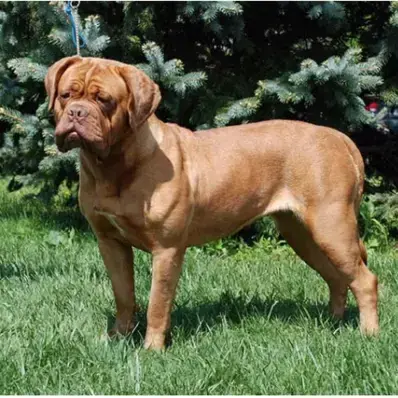Dogue de Bordeaux History/Origin
The Dogue de Bordeaux is one of the oldest AKC dog breeds, with origins so ancient that its exact history remains unclear. Some believe it’s an indigenous French breed, while others trace its lineage to Mastiff, Neapolitan Mastiff, Tibetan Mastiff, and Greek mastiff-types.
A popular theory suggests its ancestors arrived in Gaul with Julius Caesar’s legions in the 1st century B.C., serving as war dogs and gladiators. For centuries, the breed once called the Bordeaux Mastiff or Bordeaux Bulldog, existed in two sizes. The smaller Doguin vanished by the 1700s, leaving the larger Dogue de Bordeaux.
Dogue de Bordeaux History- Source: AKC.org
Over time, Dogues transitioned from fighting dogs to hunters, drafters, and guards. By the late 1700s, they protected nobles’ estates, but the French Revolution ended that role. Later, they worked as livestock drovers, earning the name ‘Butcher’s Dog’.
The breed remained largely unknown outside France until the 1989 film Turner & Hooch introduced the stubborn yet lovable Dogue to a global audience.
Dogue de Bordeaux Personality
The Dogue de Bordeaux is known for its calm, gentle demeanor, making it well-suited for families, especially those with children. This breed is highly affectionate and loyal, forming strong bonds with its family and enjoying close physical contact. Protective instincts are strong, as they have a history of guarding properties and loved ones, making them excellent guard dogs.
Despite their size, they are patient and tolerant, particularly with children. Additionally, they are independent thinkers, requiring consistent and firm training, but positive reinforcement works well. While not overly energetic, they enjoy moderate exercise and mental stimulation.
- Potential Challenges
The Dogue de Bordeaux can sometimes be independent and strong-willed, requiring firm and consistent training to establish boundaries. Their protective nature may make them wary of strangers, so early socialization is essential to avoid potential aggression.
Though generally calm, they can become stubborn, especially without clear guidance. They also require daily exercise to stay mentally and physically healthy, though their energy levels are relatively low compared to other breeds.
Dogue de Bordeaux Physical Appearance
The Dogue de Bordeaux is a large, muscular breed with a powerful yet balanced build. Its broad head, deep chest, and expressive wrinkles give it a distinctive and imposing look.
- Size
The Dogue de Bordeaux typically stands between 23 and 27 inches at the shoulder. This breed is known for its robust build, with an average weight ranging from 99 to 110 pounds. Despite their size, they carry themselves with a calm and composed demeanor, making them both impressive and approachable in appearance.
- Coat color
The Dogue de Bordeaux has short, surprisingly soft fur. Early breeding produced dogs in a variety of colors and markings, but today, they mainly come in different shades of fawn. The most common coloration is red, a darker, coppery hue, which is deeper than the classic golden fawn. Mahogany is slightly darker than red, while Isabella is a very light fawn, sometimes described as a creamy or parchment color.
These dogs may also have patches of white, though it’s considered a fault in the show ring if the white appears on the tip of the tail, head, or main part of the body. Masks are also a common marking, which can be either black or brown.
Dogue de Bordeaux Gender Differences
According to the breed standard male Dogue de Bordeaux typically stand between 24 and 27 inches at the shoulder, while females are slightly smaller, ranging from 23 to 26 inches. In terms of weight, males generally weigh between 110 and 145 pounds, while females usually range from 99 to 120 pounds.
When it comes to temperament, males tend to be more assertive and protective, often displaying a stronger guarding instinct. Females, on the other hand, are typically more nurturing and affectionate, but still protective of their family.
Both male and female Dogue de Bordeaux are loyal and affectionate. Males tend to be more independent and stubborn. Females are usually easier to train because they are more receptive.
Dogue de Bordeaux Feed/Nutrition
The ideal amount of food for a Dogue de Bordeaux is around 4 cups per day, divided into two or three meals. These large dogs require a high-quality diet rich in protein and fat. The exact amount of food needed can vary based on their age, activity level, and individual metabolism. It’s important to avoid overfeeding, as Dogue de Bordeauxs are prone to weight gain and obesity.
Healthy vegetables like broccoli and tomato can provide added nutrients, but they should be given in moderation and cooked properly to avoid any digestive issues.
Dogue de Bordeaux Health
Like all dog breeds, the Dogue de Bordeaux is susceptible to certain health issues. While not all individuals will experience these conditions, it’s important to be aware of potential health concerns associated with the breed. Here are some common health issues that can affect the Dogue de Bordeaux:
- Hip Dysplasia: Hip dysplasia is a hereditary condition where the hip joint doesn’t develop properly, leading to pain, lameness, and arthritis. To reduce the risk, ensure responsible breeding practices and provide regular, moderate exercise to maintain joint health and mobility.
- Elbow Dysplasia: Elbow dysplasia is a developmental condition affecting the elbow joint, causing lameness, pain, and arthritis. It can also be hereditary, so responsible breeding and avoiding excessive exercise or strain on the joints during growth are key preventative measures.
- Heart Problems: The Dogue de Bordeaux is prone to heart conditions such as dilated cardiomyopathy (DCM), a disease affecting the heart muscle and reducing its pumping efficiency. Regular veterinary check-ups, including heart screenings, are important to monitor heart health and catch any early signs of disease.
- Eye Health Issues: Some Dogue de Bordeaux dogs may develop entropion (inward rolling of the eyelids) or ectropion (outward sagging eyelids), both of which can cause eye irritation and discomfort. These conditions may require surgical correction, so routine eye check-ups are essential to catch any issues early.
- Skin Issues: Due to their sensitive skin, Dogue de Bordeauxs are prone to allergies, yeast infections, and skin fold dermatitis. Regular grooming, maintaining proper hygiene, and feeding a balanced diet can help keep their skin healthy and reduce the risk of these conditions.
- Gastric Dilatation-Volvulus: Bloat is a life-threatening condition that can affect deep-chested breeds like the Dogue de Bordeaux. It involves the stomach filling with gas and twisting, cutting off the blood supply. To prevent bloat, avoid large meals before or after exercise, and seek immediate veterinary attention if you suspect this condition.
It’s important to note that not every Dogue de Bordeaux will develop these conditions, and responsible breeders work to minimize the risk through health testing and selective breeding. If you are considering adding a Dogue de Bordeaux to your family, it is advisable to work with a reputable breeder who prioritizes the health and well-being of their dogs.
Dogue de Bordeaux Care and Grooming
The Dogue de Bordeaux has a short, dense coat that is relatively low-maintenance but still requires regular grooming to stay healthy. Brushing once a week is usually sufficient to remove loose hairs and prevent matting. Due to their skin folds, it’s important to clean these areas regularly to avoid infections caused by trapped moisture or dirt. Routine nail trimming, ear cleaning, and dental care are also essential to maintain overall hygiene and prevent health issues.
In addition to routine grooming, the Dogue de Bordeaux benefits from regular bathing to maintain clean and healthy skin. However, it’s important not to over-bathe, as frequent washing can strip their skin of natural oils.
Their eyes should be checked regularly for signs of irritation or infection. As a large breed, the Dogue de Bordeaux has moderate exercise needs. Low-impact activities like walking or light jogging are ideal, as they help maintain a healthy weight and prevent joint issues.
When it comes to house training, consistency and patience are key. Start early, and establish a clear routine for your Dogue de Bordeaux by taking them outside frequently.
Dogue de Bordeaux Price
Expect to pay between $1,500 to $3,000 for a Dogue de Bordeaux puppy. Finding one for sale can be challenging due to their specific breeding needs and less frequent availability. To increase your chances, consider reaching out to reputable breeders who specialize in Dogue de Bordeaux or similar mastiff breeds. Always ensure the breeder follows ethical breeding practices and prioritizes health testing, ensuring you receive a happy, healthy puppy.
Dogue de Bordeaux Rescue Groups
If you’re looking to adopt a Dogue de Bordeaux, rescue groups are a good option. They may not always have them, but breed-specific rescues occasionally do. Adopting from a rescue can be rewarding. Make sure the rescue conducts health and behavioral assessments before adopting.
Interesting Facts
- The Dogue de Bordeaux gained fame after starring in the 1989 film Turner & Hooch.
DDB in Turner & Hooch- Source: IMDb
- The Dogue de Bordeaux was recognized by the AKC in 2008, becoming the 158th breed to join the Working Group.
Best For
The Dogue de Bordeaux is best suited for individuals or families with experience in dog ownership, especially those who can provide firm, consistent training. They thrive in homes where they can receive attention and be an integral part of the family. Their affectionate nature makes them a great companion for those who can meet their exercise and grooming needs.
Top Names
| Male Dogue de Bordeaux Names | Female Dogue de Bordeaux Names |
| Maximus | Bella |
| Thor | Luna |
| Diesel | Daisy |
| Apollo | Ruby |
| Duke | Zoe |









 Dogue de Bordeaux History- Source:
Dogue de Bordeaux History- Source: 

 Mohagnay Dogue de Bordeaux- Source:
Mohagnay Dogue de Bordeaux- Source:  Red Dogue de Bordeaux- Source:
Red Dogue de Bordeaux- Source: 
 DDB in Turner & Hooch- Source:
DDB in Turner & Hooch- Source: 






